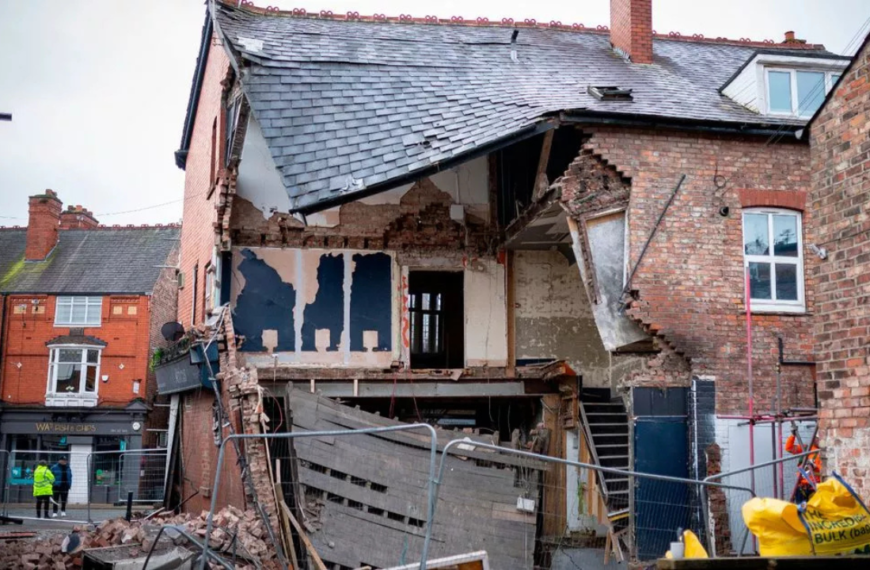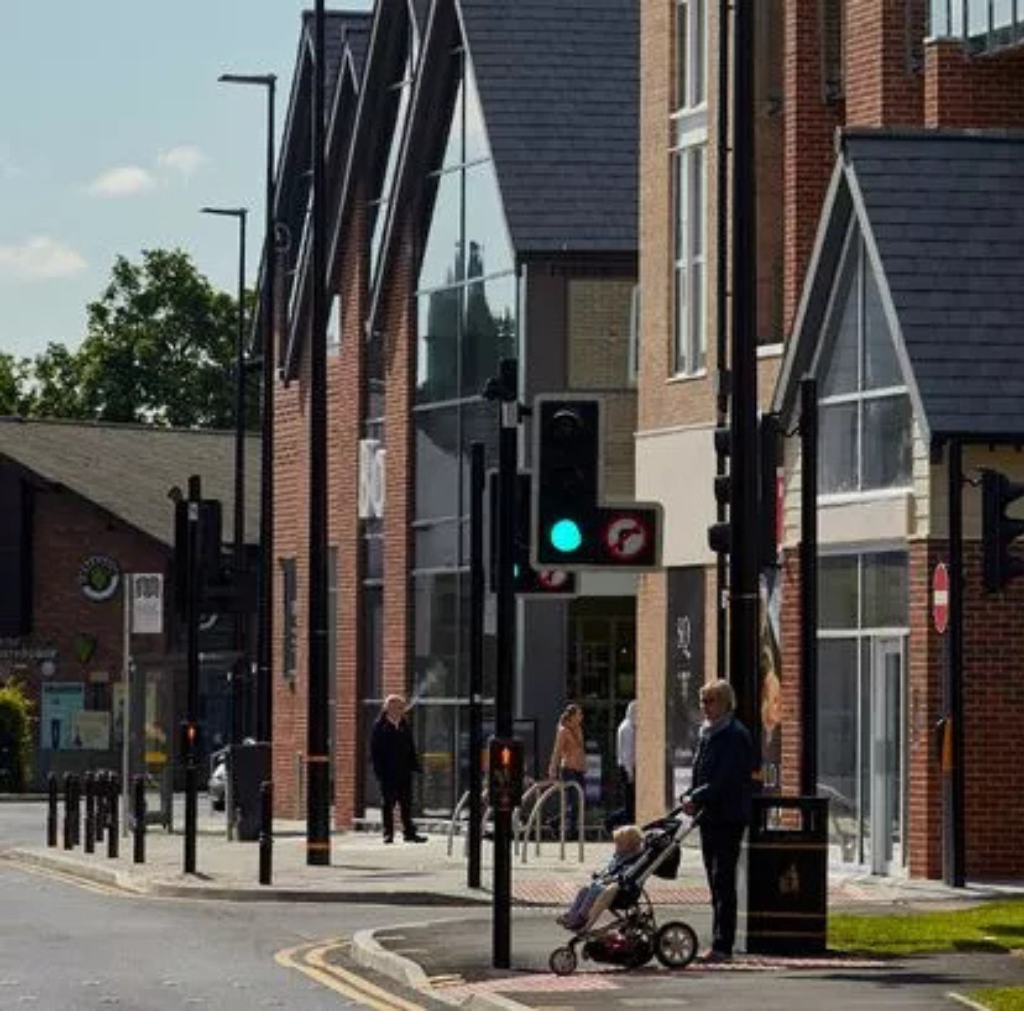The Cresta Court Hotel, a well-known landmark in Altrincham, Greater Manchester, has long been a staple of the local hospitality scene. Established as a prominent mid-range hotel, it attracted both business and leisure travelers, offering comfortable accommodations and amenities for many years. Its central location in the heart of Altrincham made it a popular choice for visitors to the area. Over time, the hotel became an integral part of the community, hosting countless events, conferences, and weddings.
However, in a recent turn of events, the hotel has now been officially closed. The building, which was once a bustling hub of tourism and business activity, will no longer serve as a hospitality venue. Instead, it has been repurposed to house asylum seekers. This decision, confirmed by local authorities, marks a significant shift in the hotel’s use, prompting a mix of responses from the community and raising questions about its future role. The closure follows a broader trend in the UK, where hotels and other public buildings are increasingly being used to provide temporary accommodation for individuals seeking asylum in the country.
The decision to close the Cresta Court Hotel and use it as a facility for housing asylum seekers comes amid a growing demand for accommodation for refugees and asylum applicants. As the UK grapples with increasing numbers of people seeking refuge, the need for temporary housing solutions has become a priority for government officials. While the closure of the Cresta Court Hotel may be seen as a necessary step in addressing this issue, it has undoubtedly sparked discussion and debate within the local community and beyond. This article will explore the reasons behind the closure, its implications for the local area, and the broader context of asylum seeker housing in the UK.
The Decision to Close the Cresta Court Hotel
The decision to close the Cresta Court Hotel and repurpose it for housing asylum seekers comes as part of the UK government’s ongoing efforts to manage the increasing number of people seeking asylum in the country. Asylum seekers, individuals who are seeking refuge due to fear of persecution in their home countries, have been arriving in large numbers, placing significant pressure on the country’s housing resources. With a growing backlog in processing asylum claims, the government has turned to unconventional solutions, including using hotels and other public buildings for temporary accommodation.
The Cresta Court Hotel was selected as one of the venues to house asylum seekers due to its available capacity and central location. Like many hotels across the UK, the Cresta Court had been impacted by the COVID-19 pandemic, which caused a dramatic decline in tourism and business travel. As the demand for hotel accommodations decreased, the building’s long-term viability as a hospitality venue was questioned. The decision to close it and use it for housing asylum seekers thus provided a practical solution, ensuring that the building remained in use while addressing the urgent need for temporary housing.
The authorities involved in this decision include the UK Home Office, which is responsible for immigration and asylum matters, and the local government of Trafford Borough. The Home Office has been under increasing pressure to provide adequate housing for asylum seekers, especially as the numbers continue to rise. Local councils like Trafford have had to navigate the complexities of providing housing while balancing the needs and concerns of the local community. This collaboration between local and national authorities aims to alleviate the strain on the asylum system, but it has not come without controversy.
The timeline of the closure and transition has unfolded over several months. The decision to close the Cresta Court Hotel was officially confirmed in the latter part of 2023, as part of the government’s broader strategy to utilize existing buildings for asylum seeker accommodation. Following the announcement, the hotel began its transition from a commercial property to a temporary housing facility. The closure was phased, with the hotel ceasing its hospitality services while preparations were made to accommodate asylum seekers. The building is expected to house individuals in need of temporary shelter for an indefinite period, depending on the speed of the asylum processing system.
This transition marks a significant shift in the hotel’s role in the community, and the authorities involved are closely monitoring the impact of this change on both the local area and the asylum seekers themselves. While this decision aims to address immediate housing needs, it has raised questions about the long-term effects on the local economy and community.
Impact on Local Community and Economy
The closure of the Cresta Court Hotel has had a notable impact on the local community and economy of Altrincham and the wider Trafford area. As a longstanding fixture in the town, the hotel had served not only as a place of accommodation but also as a hub for events, conferences, and social gatherings. Its sudden repurposing has sparked mixed reactions, especially among local businesses and residents.
Effects on Local Businesses and Residents
For local businesses, particularly those in the hospitality and tourism sectors, the closure of the Cresta Court Hotel has been a significant blow. The hotel attracted visitors who frequented nearby restaurants, shops, and other attractions, contributing to the local economy. With the loss of a prominent accommodation provider, businesses that relied on the influx of tourists and event attendees have seen a reduction in foot traffic. Restaurants, cafes, and local shops that had formed partnerships with the hotel or benefited from the guests it brought in now face an uncertain future.
Small businesses in the area, particularly those in the retail and service sectors, have expressed concern about the long-term effects of the hotel’s closure. The loss of a key establishment in the community could impact other commercial activities, and some businesses worry about the decline in the number of visitors to Altrincham. While there may be some compensatory economic activity from the presence of asylum seekers, it’s unlikely that this will fully replace the revenue generated by the hotel’s previous operations.
Residents of the area have also voiced concerns about the closure. For many, the Cresta Court Hotel was a familiar landmark and an integral part of the local landscape. Some community members have raised worries about the potential social impact of housing asylum seekers in the hotel. There are concerns about the integration of asylum seekers into the community, with some fearing that it could lead to an increase in local pressure on public services, such as healthcare, education, and housing. On the other hand, some residents have expressed support for the move, recognizing the humanitarian need to provide shelter for individuals seeking asylum.
Reactions from the Community and Stakeholders
The local reaction has been mixed. On one side, there are those who strongly support the government’s decision to repurpose the Cresta Court Hotel, emphasizing the importance of offering shelter and support to vulnerable asylum seekers. Advocacy groups and charities have welcomed the move, highlighting the need for safe, temporary accommodation for those fleeing dangerous situations. These groups argue that the asylum seekers housed at the hotel should be treated with dignity and respect, and that the local community should work towards integrating them in a supportive and inclusive manner.
On the other hand, there has been vocal opposition from some residents and local politicians. Critics argue that the decision to house asylum seekers in a local hotel could lead to overcrowding in the area, placing further strain on public resources and infrastructure. There are concerns about the social and economic pressures that could arise from a sudden influx of people into the area, particularly in a community that may not be prepared for such a change. Some local councilors and residents have called for more transparency and communication from the government about how the accommodation process will be managed and the impact it will have on the community.
Economic Implications for the Area
From an economic standpoint, the closure of the hotel has both short-term and long-term implications for Altrincham. In the short term, the immediate loss of the hotel’s operations means a reduction in employment opportunities for local workers. The Cresta Court Hotel employed a number of staff in various roles, from hospitality workers to event coordinators. The closure could lead to job losses, or at best, a shift in roles as the building transitions into a new form of accommodation.
The economic impact remains uncertain. The hotel was a steady source of revenue for the local economy, particularly in the tourism sector, and its closure could lead to a decline in the region’s overall attractiveness as a tourist destination. However, the repurposing of the hotel could also bring some economic benefits in the form of government funding to support the asylum seeker housing initiative. Local businesses may see increased spending from the individuals housed at the hotel, but it’s unclear whether this will be sufficient to offset the loss of the hotel’s previous contributions.
Ultimately, the economic effects of the closure and repurposing of the Cresta Court Hotel will depend on how the local community adapts to the change. It will also hinge on the government’s ability to manage the accommodation process effectively, ensuring that the transition benefits both the asylum seekers and the local residents. Whether the community can balance these competing interests while sustaining its economy remains to be seen.
The Role of the Hotel in Housing Asylum Seekers
The Cresta Court Hotel has been repurposed as a temporary accommodation facility for asylum seekers as part of the UK government’s broader strategy to address the ongoing crisis in the asylum system. This decision comes amid rising numbers of individuals seeking refuge in the country, placing increasing pressure on the asylum process and available housing. Hotels across the UK have become part of a solution to provide emergency housing for asylum seekers while they await the outcome of their asylum claims.
Why the Hotel Was Chosen for This Purpose
The selection of the Cresta Court Hotel for housing asylum seekers was driven by practical considerations. Asylum seekers often require immediate accommodation in safe and secure environments while their cases are processed. The Cresta Court, like many other hotels repurposed for this use, was chosen for its available capacity, location, and infrastructure that could be quickly adapted for this purpose. The hotel already had the necessary facilities such as rooms, security, and communal spaces, making it an ideal option for providing temporary shelter.
Additionally, the government’s need for quick housing solutions during a period of rising asylum claims meant turning to existing buildings, such as hotels, to house individuals in the short term. These locations are often chosen for their ease of use, as they are already equipped with heating, water, and other essential services that can be immediately accessed. In the case of the Cresta Court, its central location in Altrincham, close to transportation hubs and other amenities, made it a suitable choice for housing people who may be relocated to different areas of the country after their claims are processed.
The Government’s Stance on Using Hotels for Asylum Seekers
The UK government’s use of hotels for housing asylum seekers has been part of a broader, controversial approach to addressing the housing crisis within the asylum system. With a surge in the number of asylum applications in recent years, the government has been under pressure to find adequate accommodation. Hotels, including the Cresta Court Hotel, have been seen as a temporary solution to the immediate need for housing.
The Home Office has argued that using hotels for asylum seekers helps manage the short-term pressures caused by an overloaded system, providing accommodation while individuals’ claims are being processed. The use of hotels is also considered to be more cost-effective than building new facilities or finding alternative accommodation, especially during times of high demand. However, this practice has faced criticism from various quarters, with opponents arguing that it is not a long-term solution and that it can place undue pressure on local communities and services.
Government officials have defended the use of hotels as a temporary and necessary measure in light of the unprecedented number of asylum seekers arriving in the UK. They emphasize that the repurposing of buildings like the Cresta Court is intended to ease immediate housing shortages while a more comprehensive, long-term solution is developed. Nonetheless, the practice has been controversial, with ongoing debates surrounding the conditions of asylum seekers in these settings, as well as the social and economic impact on local communities.
Number of Asylum Seekers Expected to Be Housed
While the exact number of asylum seekers that the Cresta Court Hotel will accommodate has not been publicly disclosed, the facility is expected to house a significant number of individuals. Typically, hotels repurposed for this purpose can house anywhere from 100 to several hundred people, depending on the size of the building and the specific arrangements made by the authorities.
For the Cresta Court Hotel, the local government and the Home Office would have worked together to determine how many people the hotel can safely and securely house. The number will also depend on the size of the rooms and the types of facilities that can be provided for residents. As the hotel transitions from a hospitality venue to temporary accommodation, the authorities will likely make adjustments to ensure that the asylum seekers have access to necessary services, such as meals, healthcare, and security.
The housing of asylum seekers at the Cresta Court Hotel is expected to be a temporary measure until more permanent housing solutions can be arranged. However, with the ongoing pressure on the asylum system and no clear end in sight, it is unclear how long the hotel will continue to serve this purpose. The Home Office’s reliance on hotels for asylum seekers highlights the growing strain on the UK’s asylum system and the challenges of providing adequate, long-term housing for those in need.
Public Reactions and Controversies
The decision to close the Cresta Court Hotel and use it to house asylum seekers has sparked a range of public reactions, with debates about the measure reflecting broader concerns about immigration, local resources, and the treatment of vulnerable individuals. While some have welcomed the initiative as a necessary and compassionate response to the asylum crisis, others have voiced strong opposition, fearing the potential consequences for their communities.
Public Opinion and Debates Surrounding the Decision
The closure of the Cresta Court Hotel and its conversion into temporary housing for asylum seekers has generated significant public discussion. Many people acknowledge the humanitarian aspect of providing shelter to individuals fleeing persecution, but there are also concerns about the broader impact on local communities. Some people believe that housing asylum seekers in established hotels like the Cresta Court is a sensible short-term solution given the overwhelming demand for housing. These individuals argue that it is a responsible way to address a pressing need without the time and expense required to build new facilities.
However, there is also considerable opposition, particularly from those who view the policy as an inadequate response to the challenges of immigration and asylum management. Critics argue that repurposing hotels for asylum seekers, while a temporary measure, does not address the long-term challenges faced by the asylum system and risks putting additional pressure on already strained public services and infrastructure. There are concerns that such decisions could create social tensions, especially in areas that have not previously dealt with a large influx of asylum seekers.
Debates about the decision often focus on the capacity of local services to meet the needs of both residents and asylum seekers, including healthcare, education, and social services. Many people question whether local authorities are prepared to provide the necessary resources to support both groups effectively. In addition, there are broader fears about the potential for increased pressure on housing markets and public services, which could affect the local quality of life.
Local Protests and Support for the Measure
In Altrincham, where the Cresta Court Hotel is located, local reactions have been mixed, with both protests and expressions of support from various sections of the community. Some residents have organized protests, voicing concerns about the impact of housing asylum seekers in a hotel that was previously an established business catering to the general public. These protesters argue that the hotel’s closure will harm local businesses that rely on tourism and events and that it could lead to an influx of people into an area that is not equipped to handle the sudden change.
On the other hand, there has also been vocal support for the decision from community organizations, local charities, and some residents who view it as a step towards addressing the UK’s responsibility to offer sanctuary to people fleeing conflict and persecution. Supporters of the measure have emphasized the importance of humanitarian compassion and solidarity with vulnerable asylum seekers. Many local advocacy groups have pointed out that the area has a long history of welcoming refugees and that housing asylum seekers at the Cresta Court Hotel aligns with these values.
While the protests have garnered media attention, there has also been a strong campaign for integration and support. Some residents have called for better communication from the government and local authorities regarding how the accommodation process will unfold and how the community can support asylum seekers while ensuring that the necessary public services are in place.
Political and Social Perspectives
Politically, the decision to repurpose the Cresta Court Hotel has sparked debates between different parties and levels of government. Local politicians have expressed differing views on the measure, with some supporting it as a pragmatic solution to the immediate housing crisis, while others have raised concerns about the lack of consultation with local communities before the decision was made. Some politicians from opposition parties have criticized the Home Office for what they perceive as a lack of transparency in the decision-making process, arguing that more effort should have been made to ensure that local communities were adequately informed and prepared.
From a social perspective, the conversion of the Cresta Court Hotel highlights ongoing tensions over immigration and asylum policy in the UK. Asylum seekers and refugees often face stigma and hostility in public discourse, and the use of hotels as housing has become a focal point in these debates. Proponents of the measure argue that asylum seekers deserve dignity and respect and that housing them in temporary facilities like the Cresta Court should be seen as a necessary part of fulfilling international human rights obligations. Conversely, critics worry that housing asylum seekers in hotels—often for prolonged periods—could create division and tensions between newcomers and local populations.
The issue also intersects with wider discussions about the UK’s immigration system. While the government has defended the use of hotels as a pragmatic solution to the surge in asylum seekers, it is clear that the long-term effectiveness of such measures remains in question. Social advocates call for better long-term accommodation solutions, focusing on providing stable homes and integrating asylum seekers into local communities. However, the opposition has highlighted what they consider a lack of planning and foresight, with many arguing that the current system is not adequately equipped to address the scale of the issue.
Ultimately, the closure of the Cresta Court Hotel and its transformation into accommodation for asylum seekers has brought these social and political issues to the forefront. The public’s mixed reactions reflect the complex and often contentious nature of asylum policy and the challenges of balancing humanitarian concerns with local resources and public opinion. As the situation evolves, it is likely that these debates will continue to shape the broader discussion around asylum and immigration in the UK.
Legal and Ethical Considerations
The decision to repurpose the Cresta Court Hotel to house asylum seekers raises important legal and ethical questions. While the move is framed as a necessary response to the UK’s asylum crisis, it brings into focus both the legal framework surrounding the accommodation of asylum seekers and the ethical concerns related to the well-being of vulnerable individuals. These considerations are crucial in understanding the broader implications of using hotels as temporary housing for asylum seekers.
Legal Framework Surrounding the Use of Hotels for Asylum Seekers
Under UK law, the Home Office has a legal duty to provide accommodation for individuals seeking asylum while their claims are processed. This obligation stems from international conventions, including the 1951 Refugee Convention, to which the UK is a signatory. The government must ensure that asylum seekers are housed in conditions that meet basic human rights standards, including the right to shelter, food, and security while their cases are being assessed.
The use of hotels to house asylum seekers falls under the legal powers granted to the Home Office, particularly in circumstances of emergency or when there is a high influx of asylum seekers. Hotels, such as the Cresta Court, are often seen as a practical, short-term solution to accommodate individuals when there is insufficient government-run housing or long-term accommodation options available.
However, this use of hotels as temporary accommodation is not without legal controversy. Critics argue that the conditions in hotels can often fall short of meeting the standard of care expected for individuals seeking asylum. Issues such as overcrowding, lack of privacy, and the inadequacy of facilities have led to concerns about whether the legal obligations to provide appropriate accommodation are being fully met. In some cases, there have been legal challenges raised over the quality of accommodation provided in hotels, with asylum seekers sometimes reporting poor conditions that could be in violation of their rights under both domestic and international law.
Ethical Questions Related to Housing Vulnerable Individuals in Hotels
Ethically, the use of hotels to house asylum seekers brings up several concerns about the dignity and welfare of vulnerable individuals. Asylum seekers are often fleeing conflict, persecution, and human rights abuses in their home countries, and their journey to safety can be traumatic. The ethics of housing people who have already suffered significant hardship in temporary and impersonal hotel rooms raises concerns about the psychological and emotional impact on these individuals.
Hotels, by their very nature, are not designed to be permanent homes and lack the stability and community that are essential for individuals, especially those who are already in distress. The lack of personalized support, social services, and the absence of a community environment can exacerbate feelings of isolation and insecurity. Many advocacy groups argue that the ethical treatment of asylum seekers requires providing more than just a bed and meals; it also involves offering a sense of belonging and dignity, which hotels may struggle to provide.
Furthermore, there are concerns about the ethical implications of housing families, children, and vulnerable individuals in settings not specifically designed for long-term habitation. Families with young children, in particular, may face significant challenges living in an environment where there is little privacy, no access to educational or recreational resources, and limited opportunities to integrate into the local community. Critics argue that such conditions can negatively affect the mental health and well-being of asylum seekers, undermining the country’s ethical responsibility to protect and support those who have sought refuge.
Potential Human Rights Considerations
Human rights considerations are a central aspect of the debate surrounding the use of hotels for housing asylum seekers. Asylum seekers are entitled to certain fundamental rights, as outlined in the Universal Declaration of Human Rights and the European Convention on Human Rights. Among these rights is the right to an adequate standard of living, including adequate housing, which is seen as essential to ensuring the dignity of the individual.
While the UK government has a legal obligation to provide accommodation for asylum seekers, the quality of that accommodation is crucial. The European Court of Human Rights has ruled in the past that the state has a duty to ensure that asylum seekers are housed in conditions that respect their human dignity and offer adequate support for their physical and mental well-being. In this context, concerns have been raised about whether the conditions in hotels meet the required standards. Some argue that housing vulnerable individuals in hotels could potentially violate their human rights, especially if the accommodations are inadequate or lack essential services such as access to healthcare and mental health support.
The issue of overcrowding is a significant concern from a human rights perspective. When hotels are used to house a large number of people for an extended period, it can lead to cramped and unsanitary living conditions, which may violate the rights of asylum seekers under international law. Additionally, some have raised concerns about the lack of proper oversight and accountability in hotels, which can lead to situations where asylum seekers are not provided with the level of care and support they are entitled to.
Furthermore, there are broader concerns about whether the use of hotels aligns with the UK’s commitment to protecting the rights of asylum seekers. While housing asylum seekers in hotels may be a pragmatic solution in the short term, many human rights organizations argue that it should not become a long-term approach. The ideal solution, they say, is the provision of dedicated accommodation facilities where asylum seekers can live with dignity, receive adequate support, and have access to the services they need as they await the outcome of their claims.
While the legal framework allows for the temporary use of hotels to house asylum seekers, the ethical and human rights implications of this practice raise significant questions. Housing vulnerable individuals in hotels that were never intended for long-term accommodation can risk violating the very principles of dignity, respect, and care that the asylum process is meant to protect. It is essential that these issues be carefully considered by policymakers, with a focus on improving the quality of accommodation and ensuring that the rights of asylum seekers are fully respected during their stay.
Impact on the Hotel Industry
The closure of the Cresta Court Hotel and its repurposing to house asylum seekers has broader implications for the hospitality industry, both in the local area and beyond. The decision underscores the challenges facing the hotel sector in a period of fluctuating demand, changing public policy, and increasing pressure on available accommodation options. For the Cresta Court, this closure signals a significant shift, but it also mirrors a wider trend of hotels being used for temporary accommodation for asylum seekers in the UK. Understanding the short-term and long-term effects on the hotel industry, and comparing this situation with other hotels used for similar purposes, provides insight into the broader consequences for the sector.
Impact on the Hospitality Industry
For the Cresta Court Hotel and other similar establishments, the immediate impact of closure is felt financially and operationally. As a functioning business that catered to tourists, business travelers, and event-goers, the hotel’s closure removes a key source of revenue. Local businesses that rely on visitors to the hotel such as restaurants, taxi services, and event organizers are likely to feel the ripple effects of this shift. The loss of a regular flow of paying guests could lead to a decrease in foot traffic and sales for other nearby businesses that depend on the hospitality sector.
For the broader hospitality industry, especially in areas with significant numbers of hotels being repurposed, the impact can be more extensive. Hotels are integral to local tourism economies, and when they are taken off the market for other uses, it can create a shortage of available accommodation. In regions where hotel room demand is high, this could potentially push up prices at remaining establishments or create availability issues for travelers. This could especially hurt mid-range hotels, which serve both local and regional tourists, as they may not have the same ability to raise prices or adjust to the loss of competition.
Additionally, the hotel industry, like many other sectors, has been significantly impacted by the COVID-19 pandemic. The fluctuating demand for tourism and business travel has created uncertainty within the hospitality sector, and the decision to close hotels like the Cresta Court for asylum accommodation exacerbates this instability. Some hotel owners may see this as a temporary measure, while others could view it as part of a larger trend that may persist depending on the demand for alternative housing solutions for asylum seekers.
Short-Term and Long-Term Implications for Hotel Businesses
The closure of the Cresta Court Hotel may create operational challenges for both the hotel and its staff. Staff layoffs or redeployment could occur, and the hotel may lose its position as a key player in the local tourism and events market. Additionally, there could be a shift in the hotel’s reputation and public perception, as it moves away from its traditional role as a hospitality provider and becomes a center for housing asylum seekers. For guests who had planned to stay at the hotel, the sudden closure could lead to inconvenience, with travelers forced to seek alternative accommodation at higher rates or in less desirable locations.
For hotel owners and operators, the closure could also affect future bookings, as consumers may be uncertain about the hotel’s availability and its focus moving forward. Many hotels, especially those in urban and tourist-heavy areas, depend on a steady stream of bookings from tourists, conferences, and other events. A sudden shift in use, especially without sufficient communication or public relations efforts, could lead to a loss of consumer trust in the establishment.
The impact on the hotel industry could vary depending on how the situation evolves. If more hotels are repurposed for housing asylum seekers, it could lead to a long-term reduction in the overall hotel room supply, potentially benefiting other hotels that remain in the tourism and events market. This could result in higher occupancy rates and room prices, at least for hotels that cater specifically to travelers. However, the negative perception of hotels being used for asylum housing may continue to affect some hotel brands in the long run, as customers may become more cautious about booking in areas where hotel properties have been taken off the market for alternative uses.
Moreover, the government’s continued use of hotels as temporary accommodation for asylum seekers could create opportunities for hotels that are specifically designed or marketed as shelters, rather than those trying to cater to both tourists and asylum seekers. Some hotel operators may seek to shift their focus entirely to this new role, while others may focus on securing more stable, long-term business from other sectors, such as corporate stays or longer-term residential accommodations.
Comparisons to Other Hotels Used for Similar Purposes
The closure of the Cresta Court Hotel mirrors a growing trend in the UK, where hotels are being repurposed as accommodation for asylum seekers. Similar cases have been reported across the country, with hotels in various regions being closed or converted into temporary shelters. These repurposed hotels often face the same operational challenges, such as transitioning from a hospitality model to one that addresses the specific needs of asylum seekers.
In some instances, hotels that were repurposed for asylum accommodation have faced criticism from both local communities and hotel industry associations. The lack of long-term viability for hotels used in this way has been raised as a concern, as it can lead to a decline in the diversity of accommodations available for tourists. However, some hotels have managed to adapt to these changes more seamlessly, especially those that were already part of the budget or low-cost travel sector. These hotels may find the transition easier, as their client base is less reliant on business and leisure travelers.
Other hotels, particularly those in areas with high tourist demand or large business events, may struggle more with the shift. For example, hotels near airports or conference centers may find the loss of a stable customer base particularly disruptive, as the demand for temporary accommodations can fluctuate significantly. These types of hotels may face increased competition from other properties that have not been repurposed and may also face backlash from the local community, which could influence future bookings.
The closure of the Cresta Court Hotel has immediate and long-term effects on the local hospitality industry. The loss of a functioning hotel in the area impacts local businesses, changes the local accommodation market, and raises questions about the future of the hospitality sector in communities where hotels are repurposed for asylum accommodation. Comparisons to other hotels used for similar purposes suggest that while some establishments may adapt more easily to the transition, the overall effect on the hotel industry depends on the scale of the change and the region’s reliance on the tourism and business sectors.
Future of the Cresta Court Hotel
The future of the Cresta Court Hotel, once its role as temporary accommodation for asylum seekers concludes, is uncertain but offers several possibilities. Depending on the long-term decisions made by the authorities, stakeholders, and the hotel’s owners, the building could return to its original function as a commercial hotel, be repurposed for other uses, or continue to serve a different community need. Each of these potential futures carries implications for the surrounding community and the local economy, as well as for the hotel’s broader role within the hospitality sector.
Possible Future Uses of the Hotel After It Houses Asylum Seekers
One potential future for the Cresta Court Hotel is that it could return to its original purpose as a commercial hotel once it is no longer needed for housing asylum seekers. After the transitional period, if the demand for short-term accommodation in the area remains strong, the building could be refurbished and rebranded to appeal to both business travelers and tourists. This would involve extensive renovations to meet the standards expected by modern hotel guests, including updated facilities, guest services, and the overall aesthetic of the property. Depending on its condition and the extent of changes made during its repurposing, the process of returning the hotel to its commercial status could be costly, but it would offer a potential revenue stream for investors and stakeholders.
Alternatively, the Cresta Court Hotel could be repurposed for other community-oriented uses. If the need for emergency housing remains high or if other services such as temporary worker accommodations, student housing, or affordable housing options are required in the area, the building could be retained as a facility dedicated to these needs. For example, the hotel could become a long-term accommodation solution for vulnerable populations or those needing transitional housing, which could help address housing shortages in the area. The building’s adaptable layout and location could make it an attractive option for such initiatives, especially if the surrounding area is experiencing growth or increased demand for housing services.
Furthermore, if the building is no longer deemed suitable for residential use or commercial tourism, it could be converted into office space, a community center, or even repurposed for retail. The flexibility of the Cresta Court’s infrastructure allows for a range of future possibilities, depending on the local demand for specific services and facilities.
Long-Term Plans for the Building and Its Impact on the Community
The long-term plans for the Cresta Court Hotel will significantly impact both the local community and the surrounding economy. As the building transitions through different phases, it will be essential to consider how its continued use—whether as a hotel, housing facility, or another service—aligns with local development plans. If the hotel returns to its commercial roots, it could provide a much-needed boost to the local tourism and hospitality sectors. This could result in increased job opportunities, particularly in hospitality, and benefit local businesses that rely on tourism-related spending.
Alternatively, if the building continues to serve as housing for vulnerable populations, this could positively affect local social services by helping to address homelessness or housing shortages. However, this would require careful planning to integrate the hotel into the community in a way that does not create additional strain on already limited resources. The long-term presence of asylum seekers or other vulnerable groups in the area could lead to a change in the local demographic, influencing everything from public services to community interactions.
The community’s response to the hotel’s future use will be crucial. In areas where housing demand is high, the building’s continued use for asylum seekers or affordable housing could be welcomed by some, but met with resistance by others, especially if there are concerns about overcrowding or changes to the neighborhood’s character. Collaborative planning involving local residents, authorities, and business owners will be key to ensuring that the building’s future use aligns with broader community goals and needs.
Prospects for Reopening as a Commercial Entity
The prospects for reopening the Cresta Court Hotel as a commercial entity will depend largely on the local demand for accommodation, the state of the tourism industry, and the building’s condition after its use for housing asylum seekers. If the local economy rebounds post-pandemic and tourism in the area increases, the hotel could potentially reopen as a key player in the region’s hospitality market. For this to happen, however, the hotel would likely need to undergo significant refurbishment to ensure it meets the expectations of guests in terms of comfort, amenities, and service.
The level of competition in the local hotel market will also be a factor in the decision to reopen as a commercial entity. If there are already many hotels in the vicinity or if other accommodations have adjusted to the new demand dynamics, it may be challenging for the Cresta Court to re-establish itself in the highly competitive hospitality sector. However, if there are fewer accommodation options or new opportunities in the area, the hotel could capitalize on this by offering an attractive, well-renovated space with competitive rates.
Reopening as a commercial hotel could reinstate the building as a landmark of local tourism and business travel, once again contributing to the area’s economic prosperity. However, the uncertainty surrounding the future of the hotel means that hotel owners and local authorities will need to carefully assess market trends and community needs before committing to such a move. Collaboration with local tourism boards, business groups, and other stakeholders will help determine whether returning the Cresta Court to its original purpose is the most beneficial decision.
Conclusion
The closure of the Cresta Court Hotel to house asylum seekers marks a significant shift in the building’s history and its role within the local community. While its immediate function has changed, the long-term impact of this decision will be felt across various sectors, including hospitality, local businesses, and social services. The building’s future is uncertain but offers multiple possibilities whether it returns to its commercial roots as a hotel, serves the community in a new capacity, or remains a facility for transitional housing.
The decision has sparked a wide range of reactions, from support for providing shelter to vulnerable individuals to concerns about the broader social and economic implications for the area. As the transition continues, it will be essential for authorities to carefully consider the needs of both asylum seekers and the local population, ensuring that the building’s future use aligns with the long-term goals of the community.
Ultimately, the future of the Cresta Court Hotel will depend on a combination of local demand, economic conditions, and community engagement. Whether it reopens as a commercial hotel or is repurposed for other uses, it will continue to be a key piece of the local landscape—one that will evolve in response to the changing needs of both residents and visitors.


















